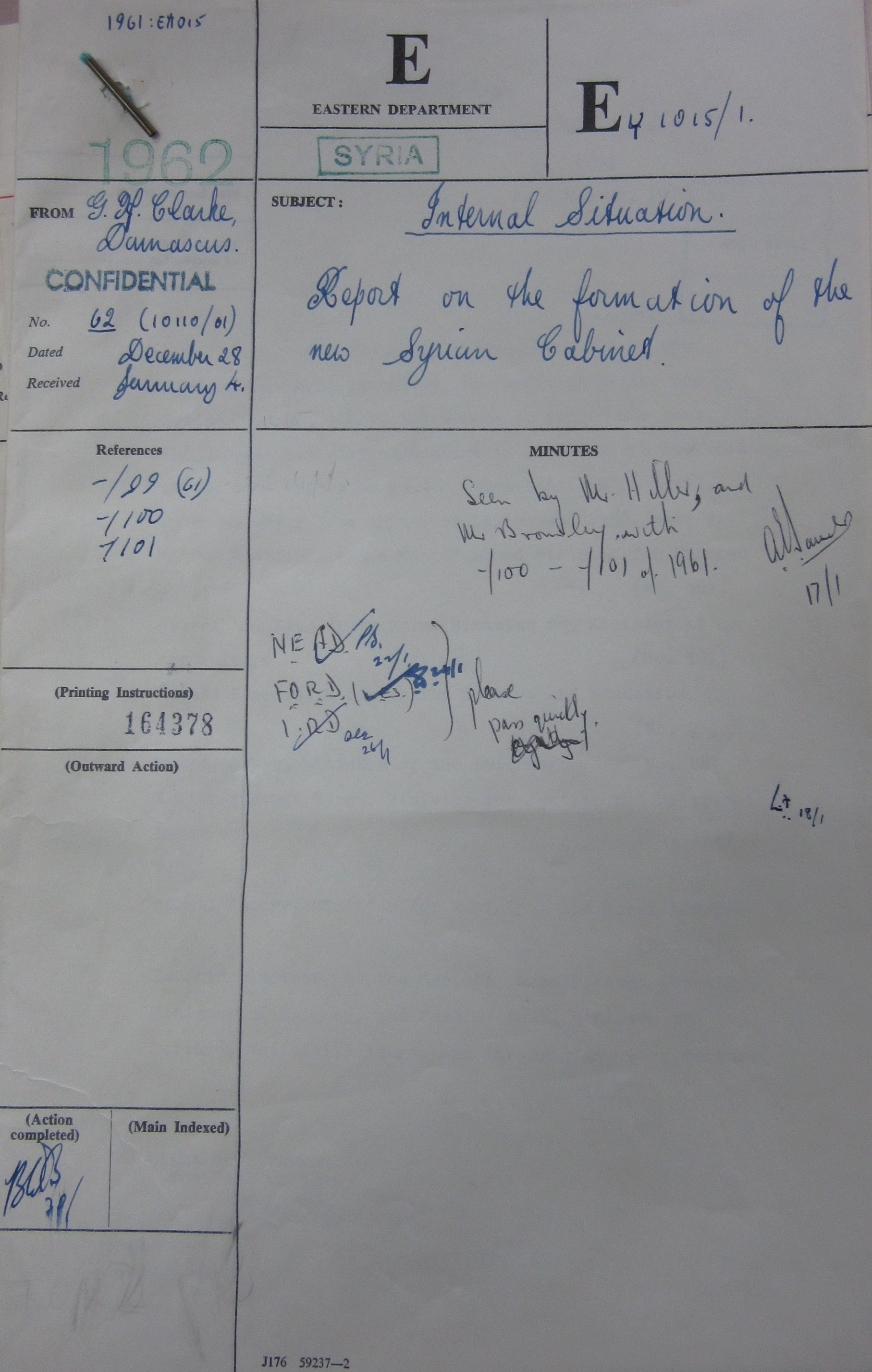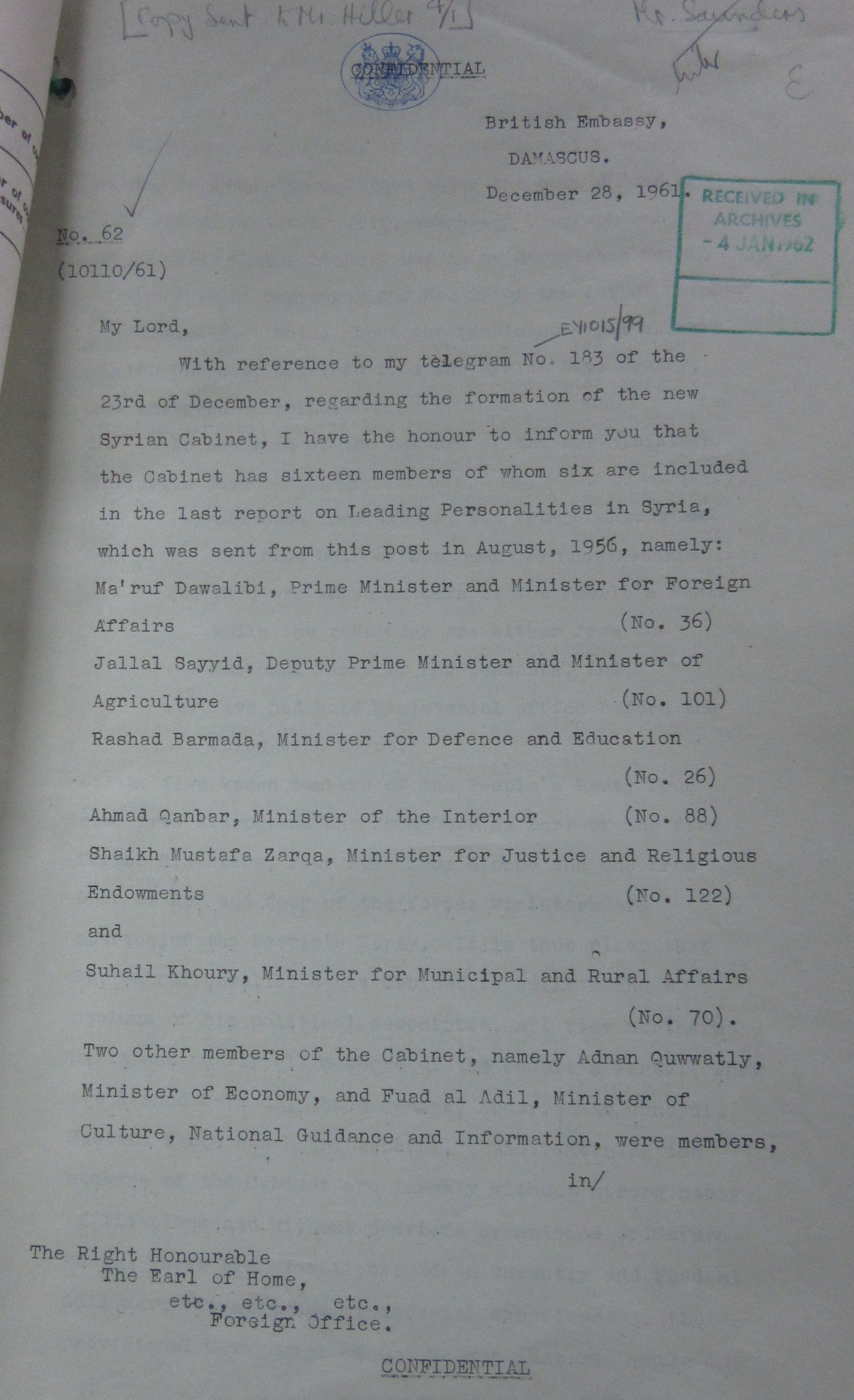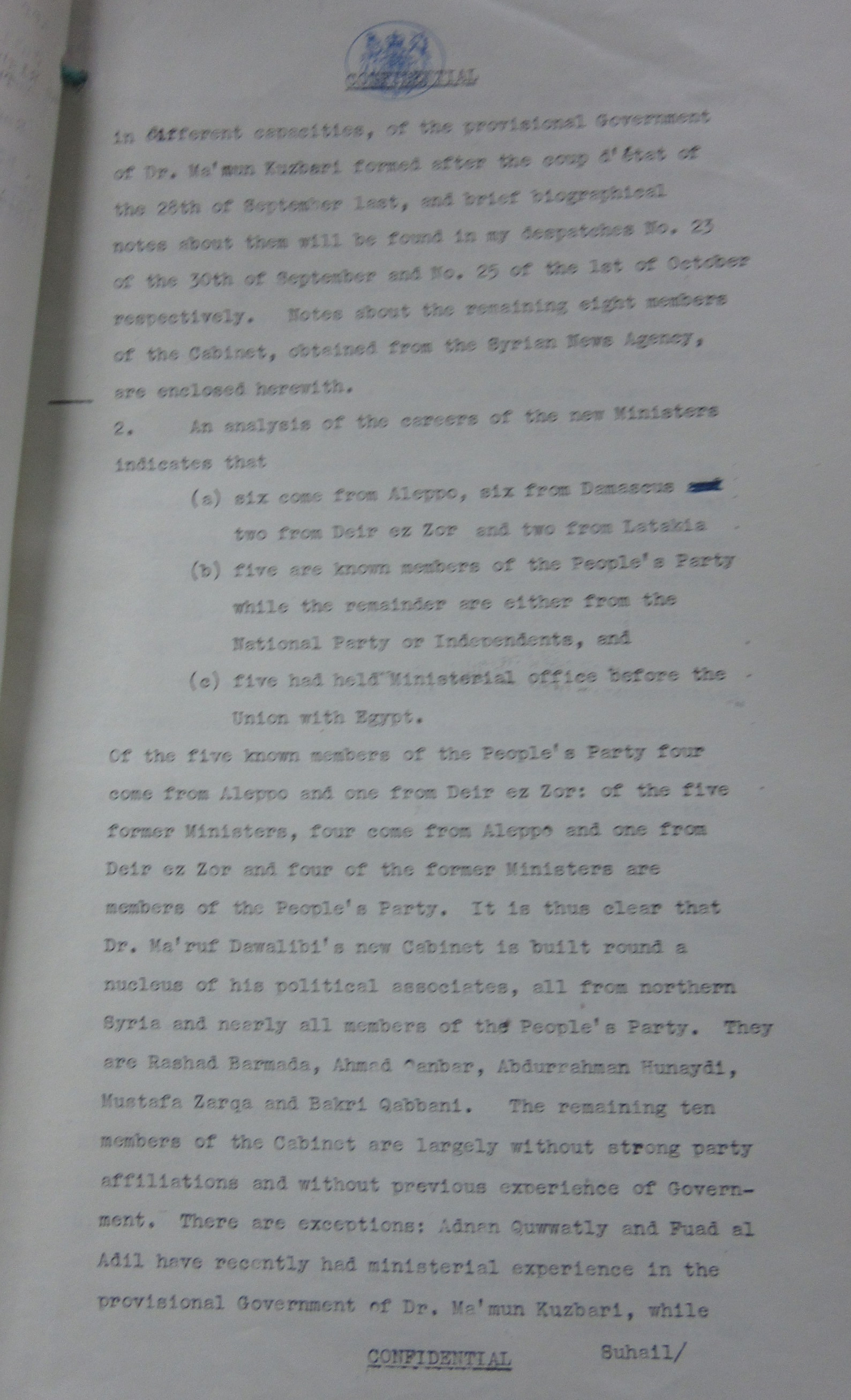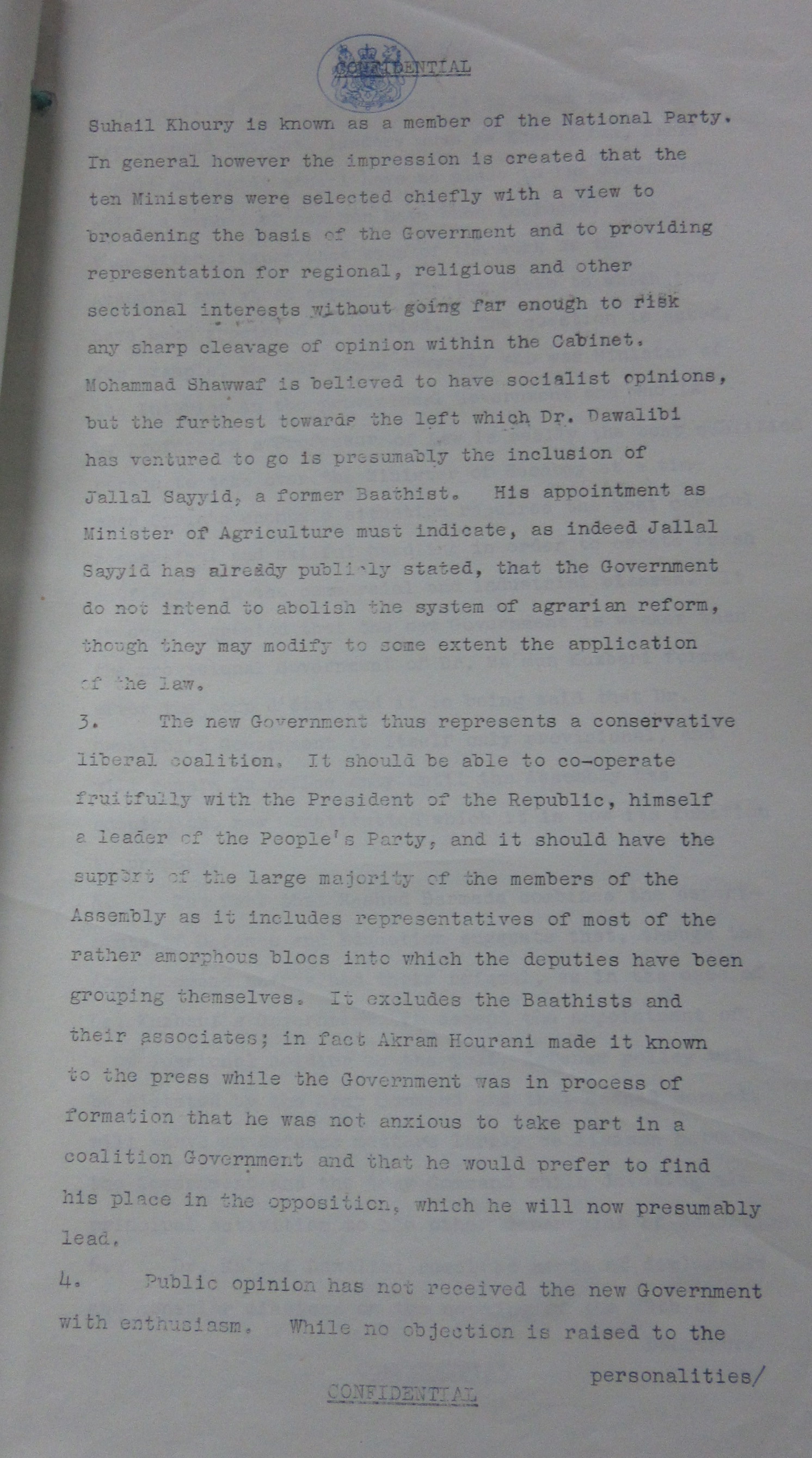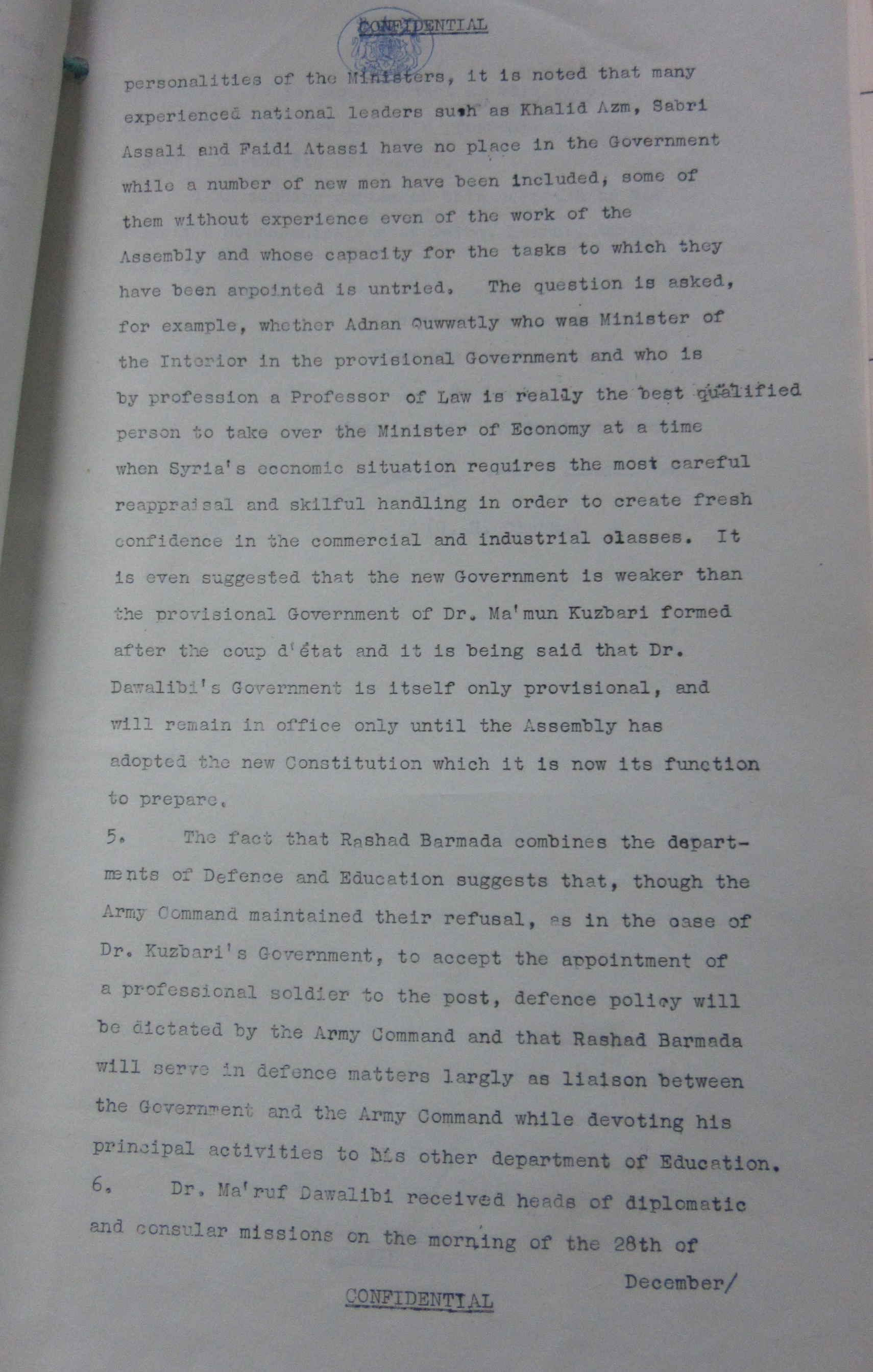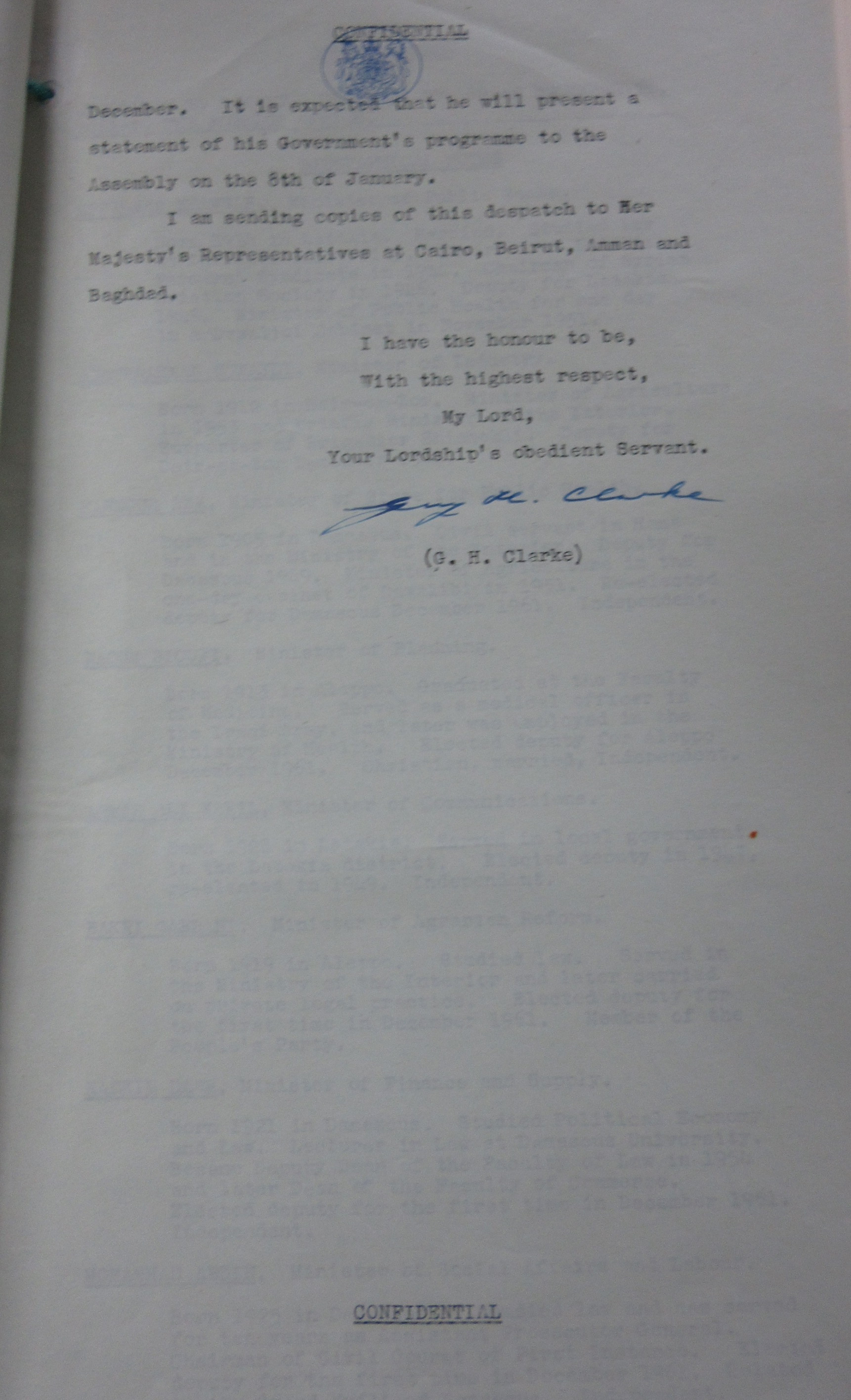Report on the formation of the Syrian Cabinet - British Embassy, Damascus - 28 December 1961
British Embassy,
Damascus.
December 28, 1961.
No. 62
(10110/61)
My Lord,
With reference to my telegram No. 183 of the 23rd of December, regarding the formation of the new Syrian Cabinet, I have the honor to inform you that the Cabinet has sixteen members of whom six are included in the last report on Leading Personalities in Syria, which was sent from this post in August 1956, namely:
Ma’ruf Dawalibi, Prime Minister and Minister for Foreign Affairs. (No. 36)
Jallal Sayyid, Deputy Prime Minister and Minister of Agriculture. (No.101)
Rashad Barmada, Minister for Defence and Education. (No. 26)
Ahmad Qanbar, Minister of the Interior. (No. 88)
Shaikh Mustafa Zarqa, Minister for Justice and Religious Endowments
(No. 122)
And
Suheil Khoury, Minister for Municipal and Rural Affairs. (No. 70).
Two other members of the Cabinet, namely Adnan Quwwatly, Minister of Economy, and Fuad al Adil, Minister of Culture, National Guidance and Information, were members, in different capacities, of the provisional of Dr. Ma’mun Kuzbari formed after the coup d’état of the 28th September last, and brief biographical notes about them will be found in my dispatches No. 23 of the 30th of September and No.25 of the 1st of October respectively.
The Right Honorable
The Earl of Rome,
etc., etc., etc.,
Foreign Office.
Notes about the remaining eight members of the Cabinet, obtained from the Syrian News Agency, are enclosed herewith.
2. An analysis of the careers of the new Ministers indicates that
-
Six come from Aleppo, six from Damascus two from Deir ez Zor and two from Latakia.
-
Five are known members of the People’s Party while
the remainder are either from the National Party or Independents, and
-
Five had held Ministerial offices before the Union with Egypt.
Of the five known members of the People’s Party four came from Aleppo and one from Deir ez Zor of the five former Ministers, four come from Aleppo and one from Deir ez Zor and four of the former Ministers are members of the People’s Party. It is thus clear that Dr. Ma’ruf Dawalibi’s new Cabinet is built round a nucleus of his political associates, all from northern Syria and nearly all members of the People’s Party. They are Rashad Barmada, Ahmad Qanbar, Abdurrahman Hunaydi, Mustafa Zarqa, and Bakri Qabbani. The remaining ten members of the Cabinet are largely without strong party affiliations and without previous experience of Government. There are exceptions: Adnan Quwwatly and Fuad Al Adil have recently had ministerial experience in the provisional Government of Dr. Ma’mun Kuzbari, while Suheil Khoury is known as a member of the National Party. In general, however the impression is created that the ten Ministers were selected chiefly with a view to broadening the basis of the Government and to providing representation for regional, religious and other sectional interests without going far enough to risk any sharp cleavage of opinion within the cabinet.
Mohammad Shawwaf is believed to have socialist opinions, but the furthest towards the left which Dr. Dawalibi has ventured to go is presumably the inclusion of Jallal Sayyid, a former Baathist. His appointment as Minister of Agriculture must indicate, as indeed Jallal Sayyid has already publicly stated, that the Government do not intend to abolish the system of agrarian reform, though they may modify to some extent the application of the law.
3. The new Government thus represents a conservative liberal coalition. It should be able to co-operate fruitfully with the President of the Republic, himself a leader of the People’s Party, and it should have the support of the large majority of the members of the Assembly as it includes representatives of most of the rather amorphous blocs into which the deputies have been grouping themselves. It excludes the Baathists and their associates; in fact, Akram Hourani made it known to the press while the Government was in process of formation that he was not anxious to take part in a coalition Government and that he would prefer to find his place in the opposition, which he will now presumably lead.
4. Public opinion has not received the new Government with enthusiasm. While no objection is raised to the personalities of the Ministers, it is noted that many experienced national leaders such as Khalid Azm, Sabri Assali and Faidi Atassi have no place in the Government while a number of a new men have been included, some of them without experience even of the work of the Assembly and whose capacity for the tasks to which they have been appointed is untried. The question is asked, for example, whether Adnan Quwwatly who was Minister of the Interior in the provisional Government and who is by profession a Professor of Law is really the best qualified person to take over the Minister of Economy at a time when Syria’s economic situation requires the most careful reappraisal and skillful handling in order to create fresh confidence in the commercial and industrial classes. It is even suggested the new Government is weaker than the provisional Government of Dr. Ma’mun Kuzbari formed after the coup d’état and it is being said that Dr. Dawalibi’s Government is itself only provisional and will remain in office only until the Assembly has adopted the new Constitution which it is now its function to prepare.
5. The fact that Rashad Barmada combines the departments of Defence and Education suggests that, though the Army Command maintained their refusal, as in the case of Dr. Kuzbari’s Government, to accept the appointment of a professional soldier to the post, defense policy will be dictated by the Army Command and that Rashad Barmada will serve in defence matters largely as liaison between the Government and the Army Command while devoting his principal activities to his other department of Education.
6. Dr. Ma’ruf Dawalibi received heads of diplomatic and consular missions on the morning of the 28th of December. It is expected that he will present a statement of his Government’s programme to the Assembly on the 6th of January.
I am sending copies of this dispatch to Her Majesty’s Representatives at Cairo, Beirut, Amman and Baghdad.
I have the honor to be,
With the highest respect,
My Lord,
Your Lordship’s obedient Servant.
(G.H. Clarke)
